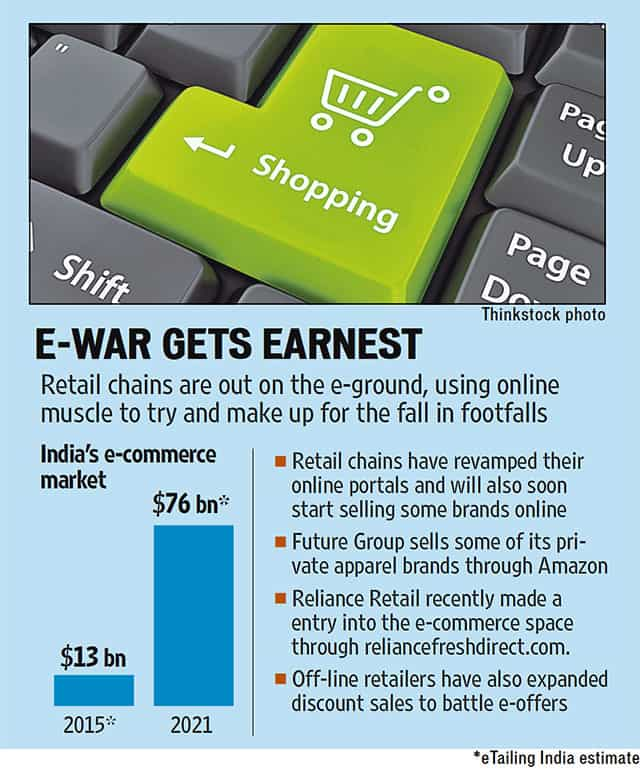Brick-and-mortar chains gird for battle with e-tailers
While high-profile e-commerce stars such as Flipkart, Snapdeal and global rival Amazon slug it out to woo India’s retail shoppers online by dangling the carrot of huge discounts and bargain hunting, the traditional brick-and-mortar chains are a concerned lot. But they are not resting.
While high-profile e-commerce stars such as Flipkart, Snapdeal and global rival Amazon slug it out to woo India’s retail shoppers online by dangling the carrot of huge discounts and bargain hunting, the traditional brick-and-mortar chains are a concerned lot. But they are not resting.

While there is some optimism that the current frenzy, backed by millions of dollars invested by private equity players, may not last in e-commerce, chains including Shoppers Shop, Big Bazaar (owned by Future Group) and Reliance Retail are also using online muscle to make up for the decline in footfalls, mainly through what they call an omni-channel strategy.

India’s e-commerce market is set to hit $76 billion by 2021 from $12-13 billion in 2014, according to eTailing India.
Kishore Biyani, the promoter of Future Group, which owns Big Bazaar, said last year that the e-commerce euphoria won’t last beyond 18 months, by which time the reality will set in. But later, Future Group inked a deal with Amazon to sell private brands online.
Heavy discounting by e-commerce firms is hurting high street retail chains. In the October-December quarter, same-store sales at Shoppers Stop’s department stores grew just 0.8%, compared with 5.5% a year ago. Future Lifestyle, which owns the Central department store chain, saw its total same-store sales growth slow to 4.3% from 7.3%. Same-store sales are sales at stores that have been open for at least one year.
To fight the online discounts, off-line retailers have expanded their own discount sales.
“There has clearly been a big impact of online,” said Govind Shrikhande, managing director of Shoppers Stop. According to his estimates, top online players spent close to Rs300 crore on advertising last quarter compared to the combined Rs30 crore by all physical retailers.
Shoppers Stop has revamped its own online portal and will also soon start selling some of its private brands on online marketplaces.
Private brands are typically high margin drivers for companies. Tata Group owned Croma also opened an online store on Snapdeal recently.
The Future Group sells some of its private apparel brands through Amazon India. It will also sell some of its private brands in the electronic goods and food products categories through the platform at a later stage.
“Partnership with Amazon will enable us to leverage their strengths, investments and innovations in technology to reach out to wider set of consumers,” Biyani said. The Future Group is investing Rs100 crore in an omni-channel push. Besides, some of Future Group’s businesses, including Planet Sports have gone live with their own e-commerce portals.
Mukesh Ambani-led Reliance Retail recently made a quiet entry into the e-commerce space through reliancefreshdirect.com. Through the portal, customers in areas of Mumbai and neighbouring Thane can order food and groceries. The company is leveraging its physical network of Reliance Fresh stores and distribution centres to supply products to the customers at their doorsteps.
“Where ever Reliance Retail has a physical network in place, its scaling up online. Every few days it adds new areas where it will deliver,” a person with knowledge of the development said.
“The potential of e-commerce, combined with the network of physical store locations will offer tremendous choice and convenience at a great value to the consumer,” the company had said in the annual report for 2013-14.
Organised retailers will need to invest much more to compete with the e-commerce giants, industry experts said.
“Established online retailers are well-capitalised and invested hugely in technology and talent.
To match up with that, the traditional retailers will have to make huge investments — to the tune of $500 million to $1 billion,” said Prashanth Prakash, partner at venture finance firm Accel Partners.





